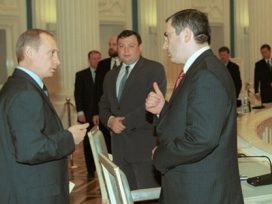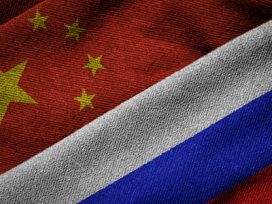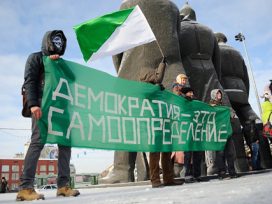After the fall of the Berlin Wall in 1989, Clifford Geertz predicted that the world would be characterized by ‘deep diversity’, ‘a sense of dispersion, of particularity, of complexity and of uncenteredness’ rather than unified world order, as stipulated by the then consensus.
In an age of identity politics and culture wars, Geertz’s insights sound even more powerful today than they did at the time. According to the American anthropologist, our task is ‘to penetrate the dazzle of the new heterogeneity’ and analyse the paradox that confronts us: the world is both more global and more divided than ever in human history. The sense that we find ourselves in ‘a scramble of differences in a field of connection’ is even more immediate, as is the realization that there is a multiplicity of alternative, sometimes conflicting and clashing, visions of the good.
This focal point, inspired by a lecture that Geertz delivered in 1995 at the Institute for Human Sciences in Vienna, summarized in the institute’s magazine, will engage with these issues. It follows the launch of a research programme of the same name at the institute in January 2023, coordinated by Clemena Antonova.
The collection of essays is an extension of earlier focal points ‘Eurasia in Global Dialogue’ (2018-2023, led by Clemena Antonova) and ‘Russia in Global Dialogue’ (2012-2018, led by Tatiana Zhurzhenko). Further texts have been contributed by journals in the Eurozine network.

In collaboration with

The conflict over YUKOS, between Russia’s two most powerful men at the time, became a turning point in post-Soviet Russian history, writes Tatiana Zhurzhenko. The expropriation of YUKOS opened the way to the annexation of Crimea a decade later; meanwhile, a new Russian masculinity was born.

The haunted house
Contemporary Russia between past and past
Twenty-five years after the USSR’s collapse, writes Maria Stepanova, history has turned into a kind of minefield, a realm of constant, traumatic revision. As a result, Russia is living in a schizoid present where the urgent need for a new language is far from being met.

The pressure valve
Russian nationalism in late Soviet society
In the 1970s and early 1980s, a movement of Russian nationalists attempted to reshape the USSR in a Russian-patriotic spirit. Alexander Mikhailovsky considers the reception of this movement among intellectual circles at the time and whether its legacy still plays a role in official Russian politics today.

Re-atomization
Or, the deliberate devaluation of social capital
At a certain point, every authoritarian state must choose democratization or collapse. But according to Ella Paneyakh, the Russian system is seeking a third way. It has in its sights nothing less than the social fabric: human interrelations, mutual support mechanisms and the capacity for joint action.

Towards a Greater Asia?
The prospects of a Sino-Russian entente
Would it be pure fantasy to suppose that the forging of closer ties between Moscow and Beijing really offers Russia an alternative to growing international isolation? No, says Andreas Umland. There is however plenty of ground for scepticism about the venture’s viability.

Siberian neo-regionalism has recently gained momentum, writes Stanislav Zakharkin; a development fuelled not least by widespread concern about the uneven distribution of revenues from the region’s oil and mineral resources. But is this diverse grassroots movement capable of effecting real change?

Anyone trespassing on any kind of sacred territory in Russia today must reckon with “millions of believers” taking offence and earnest calls to protect “traditional values”. This, writes Dmitry Uzlaner, is the stuff of political fetishism. And the stronger the fetish, the weaker the responsible citizen.
Russia's never-ending war against "fascism"
Memory politics in the Russian-Ukrainian conflict
Seventy years after the end of World War II, writes Tatiana Zhurzhenko, the fight for hegemony in Europe continues – disguised as a conflict of historical master narratives. The beginning of the current round of memory wars in the post-Soviet space can be dated back to 2005, when the sixtieth anniversary of the victory over Nazi Germany turned into a loyalty test for the politicians of neighbouring countries.
As Russia revives the tradition of wars of aggression on European territory, Vladimir Putin has chosen to rehabilitate the Molotov-Ribbentrop pact as good foreign policy. But why violate now what was for so long a Soviet taboo? Timothy Snyder explains.
Siberia survives as a single name for a territory covering two-thirds of Russia. Yet it comprises well over a dozen regions, republics and territories. Look at how the borders of Siberia were defined, writes Mikhail Rozhanskiy, and you grasp the imperial nature of Russia’s social space.
Russia’s anti-westernism and territorial revanchism have intensified. A case of deferred post-imperial syndrome linked to the collapse of the USSR? Maybe, says Kirill Rogov. But this alone hardly explains why associated policies are now apparently met with such widespread domestic popularity.
The technology of negative mobilization
Russian public opinion and Vladimir Putin's "Ukrainian policy"
How can it be that, in contrast to the international community, virtually no one in Russia believed that Russian-backed separatists shot down the Malaysian Airlines plane in July? Beyond press censorship, Lev Gudkov looks to Russians themselves, who increasingly hear only what they want to. His analysis draws extensively on research conducted by the Levada Center, presented here in numerous tables and graphs.
With Russia’s annexation of Crimea and the military conflict in eastern Ukraine, the era of post-Soviet tolerance of blurred identities and multiple loyalties has ended. Borderlands, writes Tatiana Zhurzhenko, have once again turned into bloodlands.
No wonder Aleksandr Dugin, founder of Neo-Eurasianism, has caught the attention of western analysts of Russian foreign policy. Anton Shekhovtsov confirms that Dugin, among other far-right intellectuals, has made headway in his struggle for cultural hegemony in Russia.
An insidious obsession with ratings and the suppression of the opposition: this is all that Vladimir Putin’s rule hinges on now, writes Boris Dubin. However, right up until his recent death, the Russian sociologist continued to combine keen insights into Russia’s rotten political culture with a plea for a new, enlightened historical consciousness.
Boris Dubin died on 20 August 2014. This is the last article he wrote.







